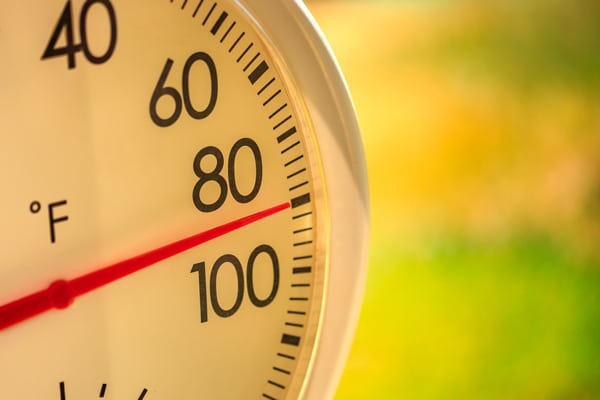How Does Hot Weather Affect Mosquitoes?

You may be surprised to learn how hot weather affects mosquito activity and the risk of West Nile virus transmission.
Mosquito reproduction.
July 2023 was one of the hottest months on record. Did you know that mosquitoes seek blood meals more often and tend to reproduce faster in hot weather? Here are a few reasons why:
Their life cycle accelerates.
Mosquitoes have four stages in their life cycle: egg, larva, pupa, and adult.
Higher temperatures warm the shallow still waters where mosquitoes typically lay their eggs. The warm water temperatures enable faster larval growth, reducing the time it takes for mosquitoes to reach adulthood.
Their metabolism and feeding levels increase.
Mosquitoes are ectothermic (ek-toe-thur-mic). This means the air temperature influences their body temperature. In hotter weather, their metabolism increases, making them more active and likely to seek out “blood meals.”
Like humans and animals, mosquitoes can become dehydrated during long hot summer days. As this happens, they seek blood meals more frequently through daylight hours. During moderately warm temperatures, peak mosquito activity occurs at dawn and dusk.
Their breeding season extends.
When the weather is hot for days or weeks, mosquitoes may have a more extended breeding season. This sustained breeding period can result in larger and more persistent mosquito populations.
They lay eggs more frequently.
Female mosquitoes actively seek blood meals because the blood provides protein essential for more frequent egg development. Warmer temperatures accelerate this process, allowing female mosquitoes to lay eggs more frequently.
One female mosquito can lay 100 fertilized eggs per batch. This, coupled with a more extended breeding season, accelerated life cycle, and feeding activity, further increases the risk of West Nile Virus transmission.
Other factors that impact the mosquito population.
While environmental factors are out of our control, we can take a variety of actions to reduce the threat of increased mosquitoes and West Nile Virus activity in our area.
Remember the 3 R’s of mosquito safety: Reduce – Repel – Report.
Reduce your risk of exposure by reducing areas where mosquitoes can lay eggs. Empty all containers of standing water, as this is a prime breeding site for mosquitoes.
Repel mosquitoes from yourself and your pets by wearing an effective mosquito repellant containing DEET.
Report areas of stagnant standing water that cannot be emptied to your local health department or local mosquito control agency.
Help Public Health help you.
In conjunction with the above, you can help public health track West Nile Virus activity in your area by notifying our office when you find a dead bird near your residence.
The bird carcass must be a perching bird in acceptable condition without deterioration or visible signs of injury.
The MCHD will collect the bird specimen and submit it to an IDPH lab for testing. We will notify you of the results.
More information on the MCHD and WNV can be found at moultriehealth.org or by calling our office at (217) 728-4114.
In the meantime, follow the 3 R’s to prevent mosquito-borne diseases and enjoy a safer summer season.

